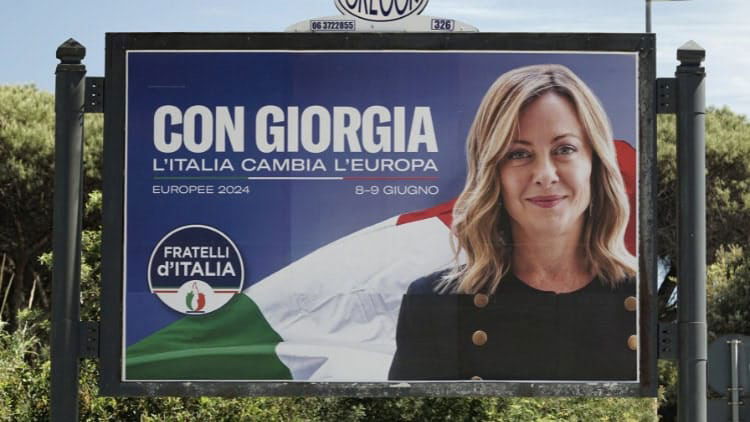The Meloni government in Italy is betting everything on radical and polarising constitutional reforms.

Italy’s prime minister, Giorgia Meloni, and its government emerged consolidated from the European Parliament election earlier this month, with 28.8 percent of the votes obtained by her far-right Fratelli d’Italia (Brothers of Italy). The European political group to which the party belongs, the European Conservatives and Reformists, is now the third force in the parliament with 83 MEPs. Identity and Democracy, the other far-right group—which includes, among others, Italy’s Lega and the French Rassemblement National—can count on 58.
Typically, Italian administrations last about a year and a half, and relatively few would have expected the one led by Meloni to be an exception. In fact, the most right-wing government in Italy’s republican history—the Fratelli and the Lega are joined by Forza Italia—would seem to have a good chance even of lasting for a full five-year legislative term.
The premierato
It also seems to be succeeding in implementing reforms proposed in the election campaign of September 2022, including the so-called premierato, under which article 92 of the Italian constitution would be amended to introduce direct election of the prime minister. This reform received a first positive vote in the Italian Senate last week, with the right-wing majority rejoicing.
It has though still to face further stages in the Chamber of Deputies and the upper and lower houses jointly. Those deliberations could lead to rejection, as could defeat in a referendum, required unless there is a two-thirds majority in the final parliamentary votes. Such an outcome would spark chaos within the government.
Ostensibly, the change is intended to prevent the outcome of elections being subverted by changes of majority during the same legislature. So the prime minister would be elected by universal suffrage for five years—no longer appointed by the president of the republic on the basis of possible majorities in parliament that have emerged from elections. Indeed, the coalition supporting the prime minister would enjoy a seat bonus, its size determined by the electoral law.
In its current form, as approved by the Senate, in the event of resignation or if the government were to lose the confidence of the two chambers, the president should invite another candidate for the premiership from the same bloc (in contrast to the manner in which the trechnocrat Mario Draghi was appointed to lead the last government amid the crisis occasioned by the pandemic). If this attempt also failed to carry confidence, the president could dissolve parliament, calling a new election. This would also be held if the lower house or Senate formally revoked the confidence given to the government.
Quite cohesive
Italy’s opposition parties currently appear quite cohesive in siding strongly against the premierato, although the most recent street demonstration, held in Rome in mid-June, lacked the centrist support of the former prime minister Matteo Renzi and Carlo Calenda. The leader of the Democratic Party, Elly Schlein, with other minor left-wing parties, and Giuseppe Conte, leader of a weakened Five Star Movement, both stand against the reform.
Civil society is also on the alert. Following expression of concern by Liliana Segre, a 93-year-old Holocaust survivor and senator, 180 constitutional experts signed a strong appeal against the reform, as profoundly altering the Italian constitution (my translation):
All the fears expressed in Senator Segre’s heartfelt speech are well-founded. The creation of a hybrid system, neither parliamentary nor presidential, never experienced in other democracies, would introduce irremediable contradictions in our constitution. Even a limited minority, through a bonus system, could take control of all our institutions, with no more counterweights and checks and balances. Parliament would run the danger of no longer representing the country and becoming a mere service structure of the government, thus destroying the separation of powers. The president of the republic would be reduced to a notary’s role and risk losing his function as arbiter and guarantor. In the face of all this, we too, like the senator, cannot and will not remain silent.
While the process for passing the reform is complicated and the opposition seems to have coalesced against it, the Meloni-led government appears very solid. Over nearly two years it has pursued a path of minimal friction with the institutions of the European Union and its regional and international allies (NATO in particular), alongside global financial markets. This low external profile has rarely been abandoned, following somehow the agenda of the administration’s Draghi-led predecessor. In contrast to such ‘moderation’, however, this distinctively right-wing government has often been radical domestically, in terms of public narratives and policies.
Similarly divisive
Beyond the premierato, similarly divisive reforms have been sponsored by the government, such as the autonomia differenziata (differentiated autonomy) strongly advocated by the Lega—which first emerged as the Lega Nord, pursuing autonomy or even independence for wealthy northern regions—and passed on June 19th. This law grants legislative autonomy to regions on matters of concurrent competence with central government and in three cases matters hitherto of exclusive state competence.
Along with powers, regions can also retain tax revenues, which would no longer be distributed on a national basis according to collective needs. This is a hotly contested proposal, because it could increase the gap between the north and the less-developed south.
One should thus beware of underestimating this Italian government. Claiming the ‘elites’ are in favor of the status quo, it has so far almost always been able to deliver what it promised—including the most polarising propositions.
Valerio Alfonso Bruno is a research fellow at the Università Cattolica del Sacro Cuorein Milan. He is co-author with James F Downes and Alessio Scopelliti of The Rise of the Radical Right in Italy: A New Balance of Power in the Right-wing Camp (Ibidem and Columbia University Press, 2024).

